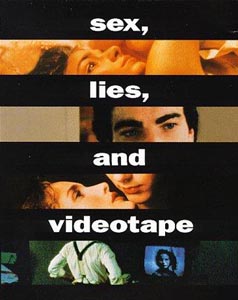
|
Review: sex, lies and videotapeBy Dan KrovichNovember 13, 2002
John (Peter Gallagher) and Ann (Andie MacDowell) are married, live in a nice house in Baton Rouge, and John has just been promoted to junior partner at his law firm. Despite that, we first meet Ann in a psychiatrist's office as she expresses that she is vaguely dissatisfied with her life. As we listen to her talk, we see that she has reason to feel like something's wrong as her husband is having an affair with her sister Cynthia (Laura San Giacomo). In his debut feature, sex, lies, and videotape, Steven Soderbergh wastes no time in disrupting what would appear on the surface to be an idyllic situation. It is this knowledge that creates the tension as we know that it is a bad situation, and we wait for the characters to come to the same realization. To complicate matters even further, into this world comes Graham (James Spader), a college friend of John's who has apparently been living for a while as a drifter. These four individuals are a study in contrasts. John is a manipulative habitual liar looking for material success who is led by his penis, while Graham espouses total honesty, lives an ascetic lifestyle, and is impotent. Ann is neurotic and uptight and always looking for something to worry about, while Cynthia is free-spirited, strong minded, and sexually free. All the ingredients are present for drastic changes and they are further catalyzed by Graham's habit of videotaping women talking about their sexual experience, desires, and fantasies. That's pretty much it as far as plot in Steven Soderbergh's talky debut feature that could alternatively be titled Four People Talking about Sex. In this case, however, the talking is steamier than the actual sex. While John and Cynthia's sex seems enjoyable enough with the extra intensity of the forbidden, it is dwarfed in excitement by the probing conversations Graham has even when he's not videotaping. It may be somewhat cliché, but sex, lies, and videotape makes the case that the trust and exposure in admitting an intimate detail to someone can often be more exhilarating than a romp in the sack. At the center is Ann, who is confused about why she is not happy with her seemingly perfect life. She senses something's wrong, but is too afraid to explore her own feelings and concerns, instead projecting them onto external problems such as what to do with all the garbage in the world. Ann seems somewhat uneasy in every conversation she's in as if she's worried that letting anything in or out will cause her safe, if unfulfilled, life to crumble. This, of course, is a legitimate worry, but on top of that, Ann lacks the confidence to see that that might be the only way to rebuild her life into something better. This uncomfortable mood is further enhanced by Soderbergh's sound design. In the beginning of the film we hear Ann speaking to her psychiatrist, but we see John and Cynthia's affair. Also, several times throughout the film, the dialogue bleeds out of the scene, so we may see the next scene starting even though we are still hearing dialogue from the previous scene. All of this creates a conflict between the aural and visual input creating a disjointed feeling that adds to the uneasiness. sex, lies, and videotape is a smart, mature drama about relationships, and the role sex plays in them. Augmented by four exceptional performances and a discerning screenplay, the film still stands up thirteen years later except perhaps for the somewhat dated anti-yuppie aspect. Time has only cemented its position as an indie classic. |
Wednesday, February 05, 2025
© 2006 Box Office Prophets, a division of One Of Us, Inc.